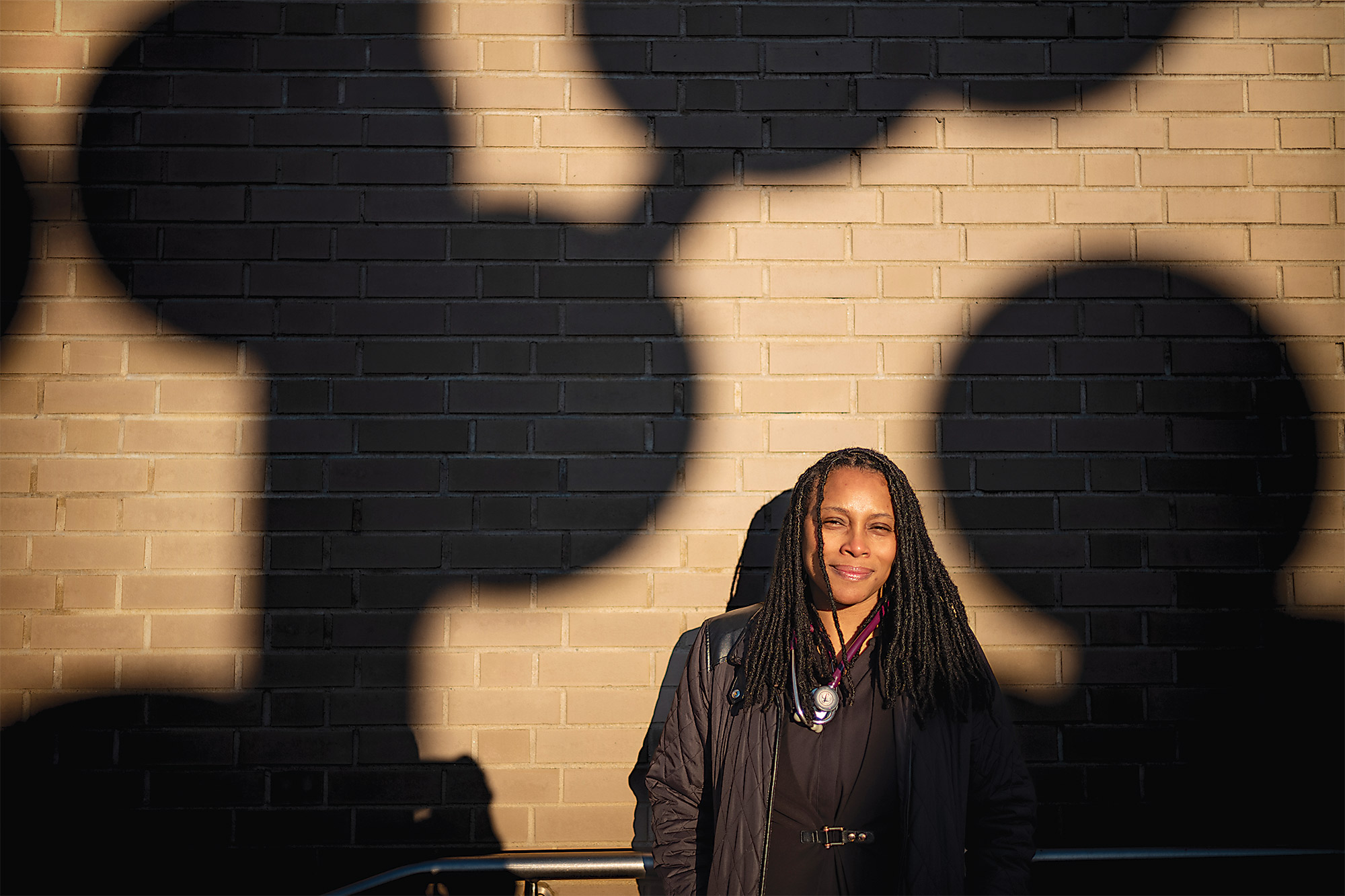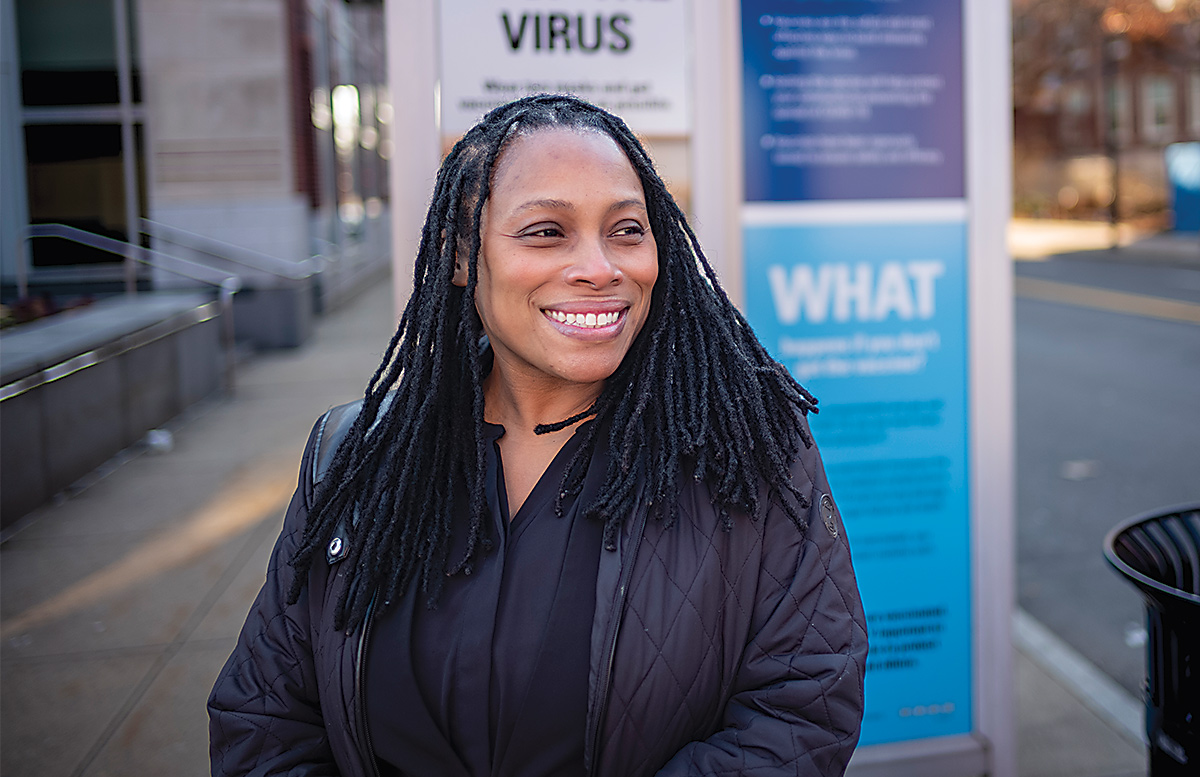A
Call
to
Action
photos by Laurence Kesterson

he COVID-19 pandemic shined a light on longstanding inequities in the U.S. health care system, manifesting in higher rates of infections, hospitalizations, and deaths among people of color and members of other underserved groups. Marcella Nunez-Smith ’96, MD, MHS hopes that light will lead the way toward what she has described as “a new and better normal” through the coming year.
“Fundamentally, what I want us to do is disrupt our pattern of predictability in terms of who gets harmed first and harmed worst every time there’s a national crisis, and I think we have the tools and a moment to maybe actually realize that,” says Nunez-Smith, the Inaugural Associate Dean for Health Equity Research at Yale School of Medicine, where she is the C.N.H Long Professor of Internal Medicine, Public Health, and Management.
In 2021, she served as the chair of the Presidential COVID-19 Health Equity Task Force and as the senior advisor to the White House COVID-19 Response Team. She previously served as co-chair of the Biden-Harris Transition COVID-19 Advisory Board and an advisor to the Biden-Harris campaign.
“It’s been an incredible honor and journey for me personally and professionally working with the Biden-Harris administration,” Nunez-Smith says. “I’ve been grateful to be part of the incredible work that they’re leading, that everyone in and across the administration is unified around. Just the centering of equity — it’s never been a talking point for this administration; it’s always been a call to action.”
Apart from her work as a senior advisor to the White House COVID-19 Response Team — which Nunez-Smith describes as focused on “daily planning and execution and implementation of what’s needed in this moment to respond in an equitable way to the pandemic” — Nunez-Smith also focused on what she calls “tomorrow work” through her role as chair of the Presidential COVID-19 Health Equity Task Force. The task force completed its work in October, issuing a report with 316 recommendations, including 55 priority recommendations.
The recommendations are bold.
The last of the priority recommendations calls on the U.S. to “recognize and establish health care as a human right, regardless of immigration status, by enacting legislation and regulations with sufficient and sustainable funding that provide health-care access and coverage for all.”
“As we continue to make progress in our pandemic response, we know the families who have lost loved ones have no ‘normal’ to return to,” Nunez-Smith wrote in an introduction to the task force’s report. “And we must ensure this country does not return to our pre-pandemic ‘normal’ either. Our ‘normal’ policies and practices are inadequate to meet the needs of so many and have made marginalized communities the most vulnerable to the tragedies of COVID-19.”
In a 2021 interview with The New York Times, Nunez-Smith, who grew up in the U.S. Virgin Islands, related how her father suffered a debilitating stroke in his 40s that left him partially paralyzed and with slurred speech. The underlying cause — high blood pressure — had never been diagnosed, and without prompt access to advanced treatments “the stroke was allowed to run its course,” Nunez-Smith said.
“He was a champion and a fighter,” she told the Times. “But my memories are of a father who had to live life with this daily reminder of how we had failed in terms of our health care. I don’t want another little girl out there to have her father suffer a stroke that is debilitating and life-altering in that way.”
Nunez-Smith’s academic research includes a range of topics related to promoting health and health-care equity. She served as principal investigator on a National Institutes of Health/National Cancer Institute-funded project to develop a tool to assess patient-reported experiences of discrimination in health care, and she has done extensive research on diversity in the health-care workforce, including research on the experiences of minority medical students and medical faculty.

Nunez-Smith, who continues to see patients, said what unifies her research agenda is a focus on community engagement and certain “fundamental approaches to how the research is done.”
“How do we think about where we get our questions?” she asks. “How do we make sure that they are responsive to needs identified by the folks most affected, most harmed by research previously? How do we have thoughtful strategic engagement that shares power, shares governance, shares decision-making in the work, that recognizes the expertise that people bring, the expertise that we bring, putting no inherent value superiority to either type of expertise but knowing that both are necessary — not because it’s the right thing to do but because it makes the science better every time.”
Nunez-Smith, who special-majored in biological anthropology and psychology at Swarthmore, knew she wanted to be a doctor from the age of 6. But she says she was shaped by the way she was taught to think about knowledge at Swarthmore, where, she says, “it was never about competition; it was always about curiosity and imagination.”
“Question deeply and imagine differently,” she says. “I carried that into medical school. I try to carry it today. It’s those sparks I think that allow us to work towards realities that are more equitable, that are different.”